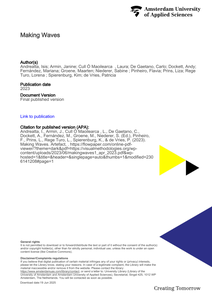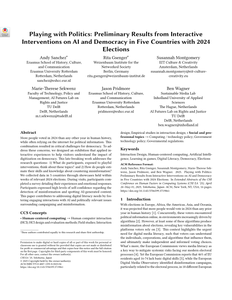Met de pilot OpER heeft Inholland de eerste stap gezet met het ‘open’ delen, vindbaar maken en hergebruiken van studentproducten en leermaterialen. In augustus 2023 is de eerste fase succesvol afgerond door samenwerking van de beleidsafdeling Beleid Onderwijsinnovatie, de Bibliotheek (deel van de stafafdeling Informatievoorziening & Technologie) en de vakcommunity van het lectoraat Design Thinking (Inholland) en het Centre of Expertise for Creative Innovation (CoECI, HvA), In deze publicatie lees je de bevindingen vanuit het perspectief van kwartiermakers en leden van het pilotteam.
DOCUMENT

Booklet met bevinden van het project 'Samen zichtbaar duurzaam' dat zich richt op de vraag: “hoe maken we zichtbaar dat duurzame verandering mogelijk en wenselijk is?”Binnen en buiten de HvA zijn er hoge ambities om met verschillende benaderingen en praktijkgericht onderzoek duurzame verandering teweeg te brengen. Mede dankzij de betrokken lectoraten, Centres of Expertise en de Green Office worden er steeds meer zaadjes geplant en verbindingen gelegd rondom het thema Duurzaamheid. Toch gebeurt het nog veel dat men niet van elkaar af weet en worden best en worst practices niet met elkaar gedeeld. Dit project wil daar zichtbare verandering in brengen. Vanuit verschillende technische, digitale en creatieve kanten, en met studenten, docenten, onderzoekers en de praktijk wordt het thema duurzame verandering op zichtbare, creatieve, interactieve enspeelse wijze benaderd.Dit project is onderdeel van de Cross-overregeling. Deze zogenaamde cross-overregeling is een initiatief van het Centre of Expertise for Creative Innovation (CoECI)en het Centre of Expertise City Net Zero (voorheen UT). De projecten die een financiële bijdrage hebben gekregen gaan over complexe uitdagingen uit de Metropoolregio Amsterdam, die vragen om een integrale benadering, met input vanuit verschillende disciplines. De regeling beoogt nieuwe samenwerkingen tussen verschillende disciplines en tussen onderwijs en onderzoek aan te jagen.
MULTIFILE
“Critical Making in Collaboration with Nature”, discusses the outcomes of the Making Sustainability Work project from Fall 2020. With support of CoECI Zaaigelden scheme, the Critical Making learning community put together a group of makers from research, education and industry to explore the implications of designing with natural materials and biological processes, such as biopolymers, fungal composites and bacteria dye. By following a selection of modules from the Fabricademy global training program, participants explored hands-on techniques to create their own design materials and colours from renewable and biodegradable resources and documented their journeys. The shared experience was reflected upon in a series of interviews and essays touching on the following questions: • In what way do unruly natural materials challenge ways of doing and teaching design? • How do grown materials fit into or challenge makers’ goals of sustainability?• What is needed to bring biological processes into communities of practice in the field of design, art and making?• How and when does criticality emerge in the making process? • How do processes of thinking and doing intersect and what is the role of social interactions and collaboration?
DOCUMENT

This is not a catalogue of finished work. This is also not a report of our collaboration on climate imaginaries. Instead, this zine offers a peek into an ongoing collaboration between artists, designers and researchers who have jointly turned their attention to the rising ocean. In riso-printed* collages, designers Carlo De Gaetano, Andy Dockett and Mariana Fernández Mora formulate their visual responses to the questions, insights and experiments we encounter on our journey. Previous research has shown that before people can accept, let alone create, the change necessary for the climate crisis, they need to first be able to imagine life in a changing climate. How can one facilitate imagination between generations and across species, geographies and materialities? Or liberate the imagination from recurring tropes that suggest climate change is of the future, elsewhere, affecting others, when so many people worldwide already live its devastating impact? These questions lie at the heart of our programme Climate Imaginaries at Sea. With the generous support of the NWA-arts route, CoECI and ARIAS, we will continue our work through artistic research studios that address global South, material and interspecies perspectives on climate change*, striving to make waves.
MULTIFILE

More people voted in 2024 than any other year in human history, while often relying on the internet for political information. This combination resulted in critical challenges for democracy. To address these concerns, we designed an exhibition that applied interactive experiences to help visitors understand the impact of digitization on democracy. This late-breaking work addresses the research questions: 1) What do participants, exposed to playful interventions, think about these topics? and 2) How do people estimate their skills and knowledge about countering misinformation? We collected data in 5 countries through showcases held within weeks of relevant 2024 elections. During visits, participants completed a survey detailing their experiences and emotional responses. Participants expressed high levels of self-confidence regarding the detection of misinformation and spotting AI-generated content. This paper contributes to addressing digital literacy needs by fostering engaging interactions with AI and politically relevant issues surrounding campaigning and misinformation.
MULTIFILE

Gezond bewegen is essentieel om de fysieke zelfredzaamheid van ouderen te bevorderen en te herstellen. De coronapandemie heeft de huidige samenleving veranderd, met mogelijke impact op (digitale) beweegbehoeftes en het welzijn van ouderen. Inzicht in de behoeftes van ouderen in deze bijzondere tijd is belangrijk, maar tegelijkertijd door de lock-down lastig te inventariseren. Dit artikel presenteert de ‘One week in the life of...’methode, een fysieke co-creatieve toolkit om op afstand te achterhalen welke voorkeuren ouderen hebben voor (beweeg)activiteiten, om na te gaan welke ondersteunende rol digitale tools hierbij kunnen spelen en ter inspiratie als mogelijke interventie. Deze toolkit is ontwikkeld omdat in een voorafgaande online vragenlijst aangaande behoeftes rondom bewegen en technologie bij ouderen (N=37) bleek dat de participanten zich met deze methode moeilijk een voorstelling konden maken van de mogelijkheden van technologie voor beweegondersteuning.In dit onderzoek hebben vijftien ouderen de opgestuurde toolkit geretourneerd. Deze toolkit bestond uit een speciaal ontworpen activiteitendagboek, activiteiten kaartjes, een folder met tips & tricks en een fitness elastiek. Uit de resultaten blijkt dat ouderen gedurende de coronapandemie voornamelijk buiten actief waren, waarbij wandelen en fietsen veelvuldig werden uitgevoerd. Hoewel technologie geen groot aandeel had in de dagelijkse activiteiten, inclusief het bewegen van ouderen, leek men hier positief tegenover te staan wanneer dit aansluit op de individuele behoeftes en contextuele situatie.De gebruikte toolkit met actieve tips en tricks creëerde meer bewustzijn rondom de digitale mogelijkheden. Over het meegestuurde fitness elastiek waren participanten enthousiast, de meeste willen deze blijvend gaan gebruiken. Verder bleek de fysieke toolkit een waardevolle methode om zowel contextuele dagelijkse inzichten te bieden aan de ouderen als de zorgprofessional. Oefentherapeuten en andere beweegprofessionals kunnen de toolkit gebruiken als instrument om inzicht te krijgen in het huidige beweeggedrag, het welzijn van ouderen en wat hen dagelijks motiveert en plezier geeft in tijden van corona.
LINK
In ‘Verbeelding in Transities’ werken negen onderzoeksgroepen van de Amsterdamse Hogeschool voor de Kunsten, de Gerrit Rietveld Academie, Hogeschool Inholland en de Hogeschool van Amsterdam samen als SPRONG-groep. Ze ontwikkelen in acht jaar met maatschappelijke partners een landelijk kenniscentrum voor creatieve innovatie en maatschappelijk verdienvermogen. De vier hogescholen zijn verenigd in het Centre of Expertise for Creative Innovation (CoECI). Als kennisinstellingen in de culturele en creatieve sector (CCS) ontwikkelen zij het maatschappelijk verdienvermogen van de professionals die zij opleiden. Juist in deze tijd van toenemende onzekerheid, ongelijkheid en maatschappelijke veranderingen is het wegvallen van activiteiten in deze sector een grote zorg. 1 De onderzoeksgroepen beschikken over een beproefde infrastructuur voor duurzame samenwerking. Er is al ervaring opgedaan in het werken in labs en het uitwisselen van kennis. Middels SPRONG werken we aan de doorontwikkeling van de onderzoeksinfrastructuur die de ontwikkeling van discipline- en domeinoverstijgende kennis mogelijk maakt, bestaande uit: 1. Een observatorium om creatieve methodieken - Key Enabling Methodologies, KEMs2 - in kaart te brengen, te ontsluiten en door te ontwikkelen vanuit culturele, etnologische en technologische onderzoeksbenaderingen, zodat ze breed inzetbaar worden; 2. Verbeeldingswerkplaatsen waar de KEMs en het maatschappelijk verdienvermogen van de CCS getoetst worden bij praktijkvragen uit het sociale domein; 3. Interventieonderzoek om de werking van de inzet van deze KEMs bij maatschappelijke transitievraagstukken inzichtelijker en beter toepasbaar te maken. De eerste vier jaar ligt de focus op de wijze waarop KEMs die verbeeldingskracht en vindingrijkheid stimuleren en bijdragen aan inclusieve participatie in maatschappelijke transitieopgaven. De investering in de kennisinfrastructuur draagt bij aan een transformatie van de onderzoeksgroepen naar een krachtige SPRONG-groep die verweven is met maatschappelijke contexten, lokaal geworteld in een robuust partnernetwerk. In de tweede vier jaar wordt de infrastructuur uitgebreid en op grotere schaal ingezet t.b.v. actuele maatschappelijke transitieopgaven.